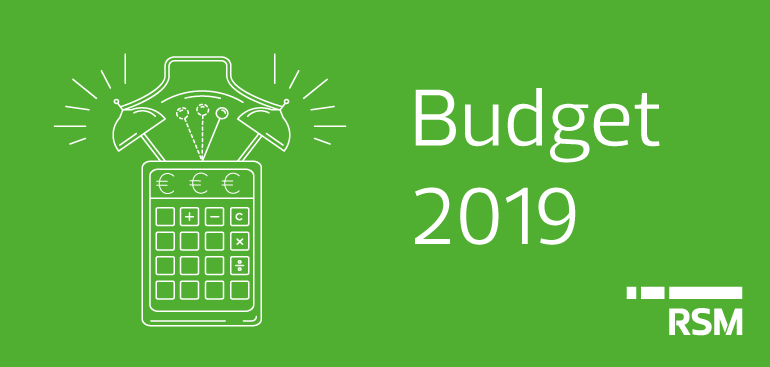
Budget 2019 was delivered by Minister for Finance Paschal Donohoe TD in a very different landscape from his predecessor ten years ago, with strong economic growth and a low level of unemployment despite the uncertainty which he referred to throughout his budget speech. Even in our thriving economy, there was significant pressure on Minister Donohoe to increase spending on the critical areas of housing and health. As a result, a small but helpful number of measures have been introduced to support the business community.
Business taxes and Incentives
The corporate rate remains at 12.5% which is expected and welcomed. Legislation will be introduced reflecting the changing international tax environment dealing with Controlled Foreign Company legislation and a review of transfer pricing will be undertaken. According to Aidan Byrne, Head of International Tax, these measures were anticipated and expected as part of Ireland international tax commitments. A new exit tax at 12.5% was announced effective from midnight tonight in certain circumstances where assets are transferred abroad.
For SMEs and agri-producers facing potentially challenging times ahead as Brexit impacts, the measures announced to assist them come in the form of a low-cost loans (Future Growth Loan Scheme) with a scheme valued at €300m and Brexit supports across department of €110m. An employee share scheme for SME employees has been enhanced to help SMEs retain key employees, but the take up to date has been low.
Start-up companies will welcome an extension of the current incentive scheme to 2021. For business growing and seeking investment, the Employment and Investment Incentive Scheme (EII) tax relief schemes can be a valuable source of funding. Shortcomings were identified in the current scheme which the Minister says will be taken on board and new measures put forward in the Finance Bill. Interestingly, crowd funding will be regularised, and measures put forward as a source of funds for businesses.
Personal taxes
The reduction in personal taxes are modest with an increase in the 20% rate band, small tweaks to USC and increases in the home carer’s credit and the earned income credit for self-employed and proprietary directors. All tax payers will benefit from the rate band change and the USC change, but the impact in take home pay will be low and certainly not a give-away budget for the average tax payer. As has been government policy, RSM note that as a proportion of income low- and middle-income earners will see higher tax saving as a proportion of total income. For low earners and casual workers a small increase in the minimum wage to €9.80 per hour will be welcomed.
Home owners will be pleased to hear that increase in LPT will apparently be affordable, but no specific details were provided as yet. There were very few changes to capital taxes with no changes in the 33% rate of Capital Gains Tax. This is disappointing though not unexpected and there has been and no changes announced to the existing Entrepreneur Relief currently €1m at 10% though there have been calls across businesses and indeed advisors for this incentive to be increased. The rate of tax on gifts and inheritance also remained unchanged at 33% with the only change being to the lifetime tax free threshold from parents to a child increasing from €310,000 to €320,000.
Landlords tax incentive
Full tax relief for landlords on interest on loans used to purchase or repairs a rented residential property has been restored and fast-tracked to 2019. This brings the tax deductibility for interest paid on rented residential properties back in line with commercial properties. It is just one of a number of measures to tackle the housing crisis with the main focus being on expenditure and in RSM’s view in itself will not be a significant factor in addressing the current housing crisis, although welcomed.
VAT and Excise
Taxes must inevitably be generated to fund the tax saving measures and the expenditure increases. As was well flagged, the main income generation will come from VAT on tourism. The 9% rate of VAT which was introduced as a temporary measure in 2013 is now increased back to 13.5%, the same rate as applies to services generally. This will impact on hotels, restaurants, entrance to tourist attractions and indeed hairdressing which had benefitted from the lower rate. The 9% rate has been retained for sporting events and newspapers and has been extended to e.publications. The tax take from the reinstated VAT rate is budgeted at €455m in 2019. Suzanne O’Neill in RSM feels that given that the restoration of the full VAT rate was inevitable, now is probably the right time to bring in the change. She comments that for individual businesses to adapt to the higher rate they are likely to pass on the rate hike to the consumer in increased prices.
Other tax raising measure include the traditional areas of cigarette/tobacco products and betting income. There has been no increase in excise duty on alcohol or fuel, although VRT on passenger diesel cars has increased. Favourable tax treatment for hybrid and electric cars has continued in this budget. Interestingly, the budget estimates include a €50m increase in PAYE tax arising from PAYE modernisation. This indicates the level of non-compliance that the Revenue Commissioners believe exists in the PAYE system currently. Pat Keegan, compliance partner in RSM, cautions that smaller businesses will struggle under the burden of PAYE compliance which is mandatory from January 2019 and with potentially hefty penalties for any errors.
